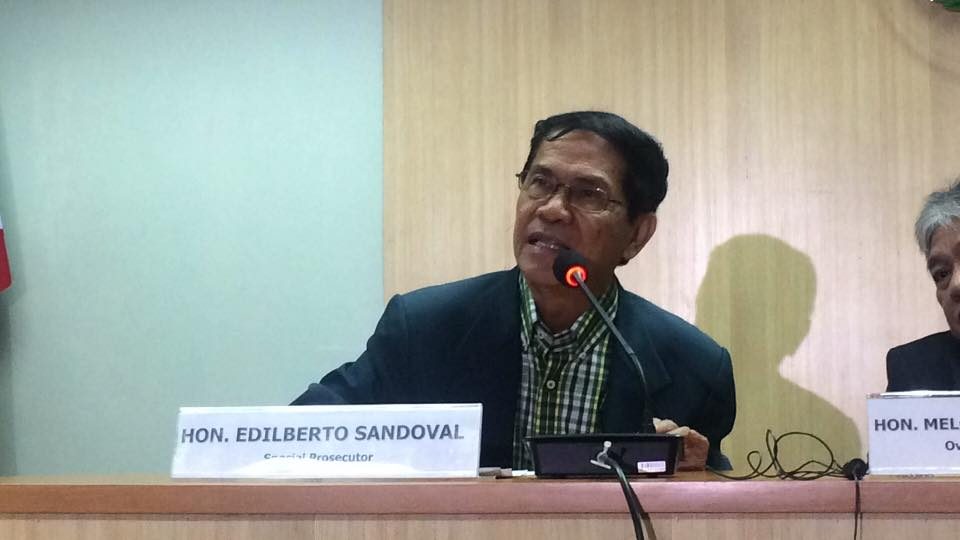SUMMARY
This is AI generated summarization, which may have errors. For context, always refer to the full article.

MANILA, Philippines – Did politics play into the decision of 3 Sandiganbayan justices to grant bail to plunder defendant Jinggoy Estrada?
“I don’t think so,” said newly-appointed Chief Special Prosecutor Edilberto Sandoval, former presiding justice of the anti-graft court, even as he admitted the ruling is questionable.
“You mean somebody interfering? I still trust that Sandiganbayan justices cannot be controlled by politics. I was there for 16 years. Tsismis lang ‘yun na may mga pulitikong nakialam (That there were politicians who interfered is hearsay),” Sandoval said in a press conference on Tuesday, September 19.
Sandoval, appointed to head the Office of the Special Prosecutor (OSP) under the Office of the Ombudsman by President Rodrigo Duterte, however, said that the ruling of his fellow former justices has questionable grounds.
A motion is being prepared to appeal Estrada’s bail grant, Sandoval said.
Grounds
First, Sandoval said, Estrada’s omnibus motion for bail is prohibited under the rules of court. His first bail plea was denied by the 5th Division consisting of different justices in 2016, and his first motion for reconsideration (MR) was again denied in May 2016.
Sandoval said a 2nd MR is prohibited, which is what Estrada did but under the name “omnibus motion”. (READ: After Jinggoy, Napoles and Revilla will now move for bail too)
“In a disguised omnibus motion, the accused Senator Estrada filed the omnibus motion alleging grounds in order to dismiss the information, but it was focused more on the attack on the resolution denying bail,” Sandoval said.
Secondly, Sandoval cited the dissenting opinion of Associate Justice Zaldy Trespeses in saying the new 5th Division should have conducted hearings on the 2nd motion for bail.
And finally, Sandoval said it is clear that what Estrada is accused of is conspiracy to commit plunder and therefore could be considered the main plunderer.
“The ruling has been echoed and re-echoed in the jungle of criminal jurisprudence that the act of one is the act of all,” said Sandoval.
‘Main plunderer’
Sandoval allayed fears that the ruling, which cited the “main plunderer” doctrine would set a domino effect in the junking of other pork barrel scam cases.
“I don’t think so. There is no need for the information to say that this accused is the main plunderer, all are charged, they were charged in conspiracy, governmentt officials, together with private individuals. Definitely one of them is main plunderer,” Sandoval said.
The majority ruling penned by Associate Justice Maria Theresa Mendoza-Arcega, with concurrences from Associate Justices Reynaldo Cruz and Lorifel Lacap-Pahimna, cited the Supreme Court (SC) acquittal of former president Gloria Macapagal-Arroyo, saying the plunder case against her did not identify a main plunderer and therefore should be dismissed. (READ: SC acquittal of Arroyo helps Jinggoy Estrada get bail)
Part of Arcega’s ponencia reads: “It may be validly questioned if there can still be a main plunderer when someone else appears to be the mastermind of the entire scheme.”
Sandoval said that other pork barrel scam cases would be affected if the main plunderer doctrine is applied.
But he also said it will be part of their appeal to insist that Arroyo’s case is “starkly different” from the pork barrel scam cases.
“I have trust and confidence even in the Sandiganbayan and Supreme Court that they will not have a sweeping application of the ruling, that there must be a pinpointed main plunderer, otherwise it would affect many cases. We will cross the bridge when we reach it. We are ready to argue that,” Sandoval said.
Sandoval
A judiciary source is not as optimistic as Sandoval, even saying that the bail grant has “made it difficult to convict on the basis of plunder.” The source said it is “institutionalized impunity.”
Sandoval served as justice for the anti-graft court for 16 years. He was appointed Presiding Justice in 2010 by former president Benigno “Noynoy” Aquino and then retired in 2011.
Sandoval also once voted to grant bail to a plunder defendant, and under similar circumstances, in the Estrada case. (READ: Court ‘war’ over Garcia plea bargain deal)
In 2010, Sandoval as chair of the Second Division, voted to approve the bail grant of retired major general Carlos Garcia in his plunder case. Because he was outvoted in his division, a special division was created which then rejected the bail motion.
But Garcia would eventually strike a plea bargain deal with the Office of the Ombudsman under Merceditas Gutierrez’s leadership.
In the Estrada case, 5th Division Chair Associate Justice Rafael Lagos voted to deny the bail motion but he was outvoted by Cruz and Arcega. Under the Sandiganbayan rules, if the regular division fails to reach a unanimous vote, a special division of 5 shall be created and the majority vote will prevail then.
Sandoval appeared confident in saying that the bail grant could always be recalled when prosecutors’ evidence eventually becomes strong.
“If it appears that in the course of the presentation of evidence that evidence is now clear, evidence of guilt is strong, the court can recall its ruling,” said Sandoval. – Rappler.com
Add a comment
How does this make you feel?
There are no comments yet. Add your comment to start the conversation.